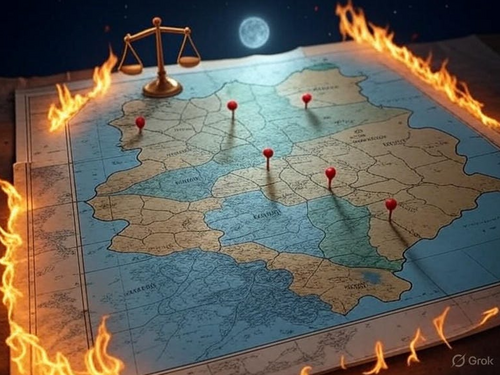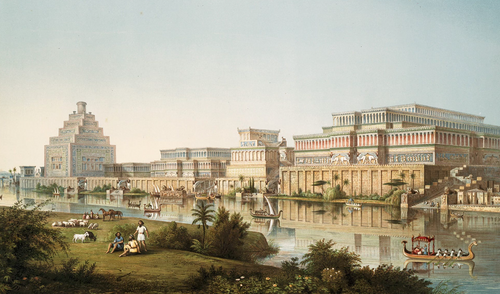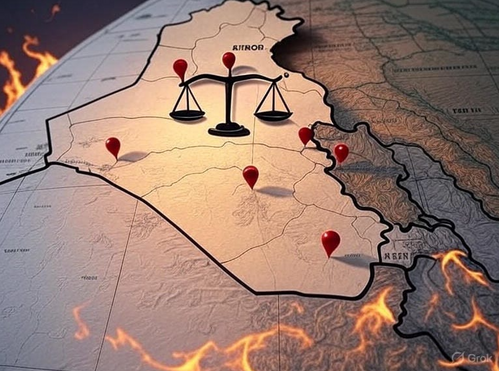September 10th, 2025
by Zach Terry
by Zach Terry
Nahum - The Mills of God
Nahum - The Mills of God
In an era of endless conflicts, corrupt empires, and unchecked power, the ancient prophet Nahum offers a timeless reminder: God's justice grinds slowly, but it grinds exceedingly fine. Dive into this minor prophet's major message—and find hope for today.

Ever feel like the world is boiling over with injustice? From global superpowers flexing their might to everyday bullies getting away with cruelty, it can seem like the bad guys always win. But what if I told you that history—and Scripture—proves otherwise? Enter Nahum, a lesser-known prophet whose words pack a punch, especially when read alongside his predecessor, Jonah.
Nahum isn't just ancient history; it's a blueprint for understanding how divine justice operates in our chaotic times. Written around 150 years after Jonah's famous fish tale, Nahum flips the script on Nineveh, the Assyrian capital. Where Jonah brought mercy and repentance, Nahum delivers judgment. As the 3rd-century philosopher Sextus Empiricus put it (later echoed in a famous German poem): "The mills of the gods grind slowly, but they grind exceedingly small." In other words, God's justice might simmer like boiling milk—taking forever to bubble up—but when it overflows, there's no turning back.
Let's unpack Nahum's message, drawing from sermon notes that bring this minor prophet to life. We'll explore the historical backdrop, the prophetic warnings, and how it all connects to our world today. Buckle up; this is good news for the oppressed and a wake-up call for the proud.
Nahum isn't just ancient history; it's a blueprint for understanding how divine justice operates in our chaotic times. Written around 150 years after Jonah's famous fish tale, Nahum flips the script on Nineveh, the Assyrian capital. Where Jonah brought mercy and repentance, Nahum delivers judgment. As the 3rd-century philosopher Sextus Empiricus put it (later echoed in a famous German poem): "The mills of the gods grind slowly, but they grind exceedingly small." In other words, God's justice might simmer like boiling milk—taking forever to bubble up—but when it overflows, there's no turning back.
Let's unpack Nahum's message, drawing from sermon notes that bring this minor prophet to life. We'll explore the historical backdrop, the prophetic warnings, and how it all connects to our world today. Buckle up; this is good news for the oppressed and a wake-up call for the proud.
Who Was Nahum? A Prophet from the Shadows

Very little is known about Nahum himself. He's called "Nahum the Elkoshite" (Nahum 1:1), but Elkosh's location is a mystery—possibly in Judah, northern Israel, or even Assyrian territory. Some scholars link it to Capernaum, where Jesus later based His ministry. What we do know: Nahum prophesied against Nineveh, just like Jonah. But while Jonah's era saw God's mercy prevail, Nahum's time brought justice crashing down.
Why the delay? Jonah wanted the hammer to fall immediately on Assyria's cruel empire, but God extended grace. It took 150 years for judgment to arrive—proving that God's timeline isn't ours. Illustration: Boiling milk seems stagnant until you look away for a second, and suddenly it's everywhere. In today's fast-paced world of instant outrage, Nahum reminds us: Patience in justice isn't weakness; it's precision.
Why the delay? Jonah wanted the hammer to fall immediately on Assyria's cruel empire, but God extended grace. It took 150 years for judgment to arrive—proving that God's timeline isn't ours. Illustration: Boiling milk seems stagnant until you look away for a second, and suddenly it's everywhere. In today's fast-paced world of instant outrage, Nahum reminds us: Patience in justice isn't weakness; it's precision.
Historical Context: Assyria's Rise and Fall

After King Solomon's death, Israel split into Judah (south) and Israel (north). Meanwhile, Assyria— with Nineveh as its glittering, brutal capital—rose as a superpower. Key Assyrian kings like Tiglath-Pileser III conquered northern tribes, Shalmaneser captured the 10 northern tribes, Sennacherib besieged Jerusalem (only to lose 185,000 soldiers to an angel), and Ashurbanipal expanded into Egypt.
Assyria was infamous for terror: skinning prisoners, impaling captives, and mass deportations. Nineveh, near modern-day Mosul in Iraq (where Kurds, descendants of the Medes, still live), was at its peak. Judah suffered under this dominance, including Sennacherib's 701 B.C. siege. Nahum's prophecy? A reassurance that God hadn't forgotten His people.
Prophetic voices like Zephaniah echoed this: "He will make Nineveh a desolation, a dry waste like the desert" (Zephaniah 2:13 ESV). And who fulfilled it? A coalition of Babylonians, Medes, and Scythians in 612 B.C., breaching the city via flooding river gates—just as Nahum predicted.
Relate this to today: Think of modern empires built on cruelty and corruption. Nahum whispers: No power is eternal. Pride goes before a fall (Proverbs 16:18).
Assyria was infamous for terror: skinning prisoners, impaling captives, and mass deportations. Nineveh, near modern-day Mosul in Iraq (where Kurds, descendants of the Medes, still live), was at its peak. Judah suffered under this dominance, including Sennacherib's 701 B.C. siege. Nahum's prophecy? A reassurance that God hadn't forgotten His people.
Prophetic voices like Zephaniah echoed this: "He will make Nineveh a desolation, a dry waste like the desert" (Zephaniah 2:13 ESV). And who fulfilled it? A coalition of Babylonians, Medes, and Scythians in 612 B.C., breaching the city via flooding river gates—just as Nahum predicted.
Relate this to today: Think of modern empires built on cruelty and corruption. Nahum whispers: No power is eternal. Pride goes before a fall (Proverbs 16:18).
Chapter 1: Proclamation of Doom and Hope

Nahum opens with a bang: Doom for Assyria, hope for Israel. It's dynamic—what curses one blesses another. Illustration: The farmer's horse runs away ("bad news?"), returns with more ("good news!"), son breaks leg ("bad!"), skips war ("good!"). Scripture often works this way: Nahum's words curse Assyria but answer Israel's prayers.
The text is poetic, an acrostic for memorability: "The Lord is a jealous and avenging God" (Nahum 1:2 ESV). Jealous? Not envious (wanting what's not yours), but protective—like a husband guarding his wife. Oprah once struggled with this concept, confusing it with envy. But God's jealousy is holy passion for what's His—stirring wrath against oppressors like Assyria.
Boldly, Nahum declares: "What do you plot against the Lord? He will make a complete end" (1:9). At Assyria's pinnacle, this was revolutionary. It ends with hope: "Behold, upon the mountains, the feet of him who brings good news" (1:15)—echoing peace for Judah.
In 2025's world of plots and power grabs, Nahum asks: Who's plotting against good today? God's jealousy protects the faithful.
The text is poetic, an acrostic for memorability: "The Lord is a jealous and avenging God" (Nahum 1:2 ESV). Jealous? Not envious (wanting what's not yours), but protective—like a husband guarding his wife. Oprah once struggled with this concept, confusing it with envy. But God's jealousy is holy passion for what's His—stirring wrath against oppressors like Assyria.
Boldly, Nahum declares: "What do you plot against the Lord? He will make a complete end" (1:9). At Assyria's pinnacle, this was revolutionary. It ends with hope: "Behold, upon the mountains, the feet of him who brings good news" (1:15)—echoing peace for Judah.
In 2025's world of plots and power grabs, Nahum asks: Who's plotting against good today? God's jealousy protects the faithful.
Chapter 2: The Vivid Fall of Nineveh
Nahum paints a cinematic scene: Chariots racing like lightning, shields red with blood, palace "melting" in defeat. Assyria's lion symbol? Rendered toothless. "The river gates are opened; the palace melts away" (2:6 ESV)—historically accurate, as Babylonians flooded the Khosr River to breach defenses.
"Where is the lions’ den?" (2:11). The mighty empire crumbles: "Behold, I am against you, declares the Lord" (2:13). Imagine this as ancient war reporting—timeless for today's conflicts.
"Where is the lions’ den?" (2:11). The mighty empire crumbles: "Behold, I am against you, declares the Lord" (2:13). Imagine this as ancient war reporting—timeless for today's conflicts.
Chapter 3: Why the Judgment? A Prophetic Assessment
Woe to the "bloody city" full of lies, plunder, and betrayal (3:1). Reasons: Cruelty (heaps of corpses), corruption (bribery like "whorings"). Nahum compares Nineveh to fallen Thebes: "Wasted is Nineveh; who will grieve for her?" (3:7). No one—its evil was unceasing.
Final verse: "All who hear the news about you clap their hands over you" (3:19). Sound like corrupt systems today? Nahum's "woe" parallels Jesus' curses on Galilean cities—judgment for unrepentant pride.
Nineveh's destruction was so total, it was thought mythical until rediscovered in 1845. Lesson: Empires fall; God's sovereignty endures.
Final verse: "All who hear the news about you clap their hands over you" (3:19). Sound like corrupt systems today? Nahum's "woe" parallels Jesus' curses on Galilean cities—judgment for unrepentant pride.
Nineveh's destruction was so total, it was thought mythical until rediscovered in 1845. Lesson: Empires fall; God's sovereignty endures.
Practical Applications: Nahum for Today
- God's Universal Sovereignty: He's not just Israel's God—China, Honduras, the USA, all nations answer to Him. In a globalized world, this humbles us.
- War on Pride: No empire or individual is untouchable. Wage war against arrogance in your life.
- Divine Sovereignty and Human Responsibility: God used Assyria as His "rod" to discipline Israel (Isaiah 10:5-6), then judged it for pride (Isaiah 10:12). Pattern seen in Babylon, Rome—and foreshadowing Revelation's "Babylon." Nations rise for purpose but face accountability.
Connection to Christ: Refuge in the Storm

The Maximum Life Blog
My name is Zach Terry. The thoughts and opinions expressed in this blog are my own, with occasional interjections from my bride of nearly 25 years, Julie. This format of publication is meant to allow for engagement and interaction. Feel free to comment. But please, be nice.
Recent
Archive
2025
February
March
July
August
September
October
Why We Should Bless IsraelGovernment Shutdowns and God’s Blueprint for Smaller GovernmentSodom, Netflix, and the Two Paths Before UsRevival Isn’t a Rumor — It’s HappeningCompassion and ConsequencesIt’s Time to Stop Playing It SafeA New Door OpensPreach the Word. Show Your Hand.When “Love Your Neighbor” Becomes a WeaponA New Day DawningPaving the Way of Anti-ChristThe Church and the Honky-TonkMy Personal Position on Israel
2024
April
May
August
November
No Comments